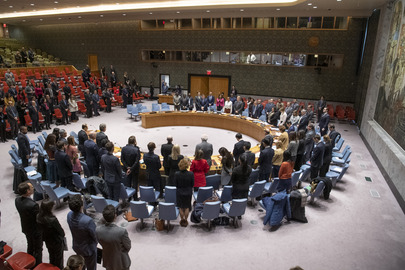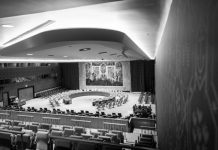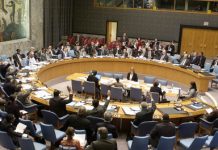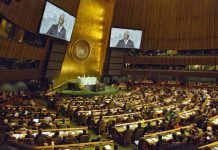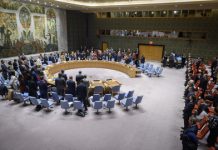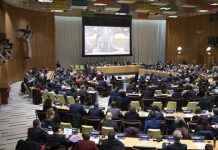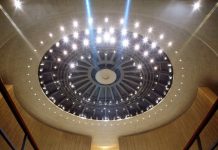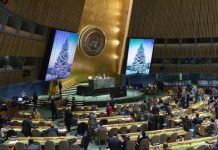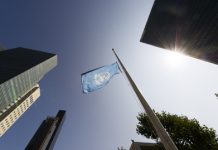Gaza crisis: Amid winter storms, humanitarians appeal for full aid access
Three weeks since the ceasefire began between Hamas and Israel, the UN Children’s Fund (UNICEF) issued a new warning on Monday about dire conditions across the enclave.
Some 60 per cent of buildings lie in ruins after more than 15 months of constant Israeli bombardment and shelter remains a major problem, UNICEF’s Rosalia Bollen told UN News, from Deir Al-Balah:
“It’s incredibly cold. It’s freezing, I have no clue how people can sleep at night in their makeshift tents. Lots of people who return to the north found their homes in rubble. They’ve put up some sort of improvised dwelling on top of their rubble, but it’s very, very cold…we do all we can to immediately push items out to families, but you know the needs are just skyrocketing … we humanitarians aren’t magicians. We don’t have a magic wand that can help the suffering overnight.”
The development comes as the Israeli military completed its withdrawal on Sunday from the Netzarim Corridor in Gaza that had left the enclave cut in two.
In a fresh appeal for an end to all restrictions on the delivery of relief to Gaza, the UN health agency warned that the health system lies in ruins.
“Malnutrition is rising (and) the risk of famine persists,” said Dr Hanan Balkhy, the UN World Health Organization (WHO)’s Regional Director for the Eastern Mediterranean.
According to the UN aid coordination office, OCHA, nearly one million displaced Palestinians live in “substandard tents or makeshift shelters, with families resorting to sewing old rice sacks together for basic cover”.
Two mass graves discovered in Libya, migrants likely buried there
Two mass graves likely containing the bodies of migrants have been discovered in Libya, highlighting the ongoing, deadly dangers facing vulnerable people fleeing conflict and poverty, the UN migration agency, IOM said on Monday.
Nineteen bodies were discovered in Jakharrah, around 400 km south of the coastal city of Benghazi, while at least 30 more were found in a mass grave in the Alkufra desert in the southeast. It is believed the second grave may contain as many as 70 bodies.
It is not yet known how the people died nor their nationalities, although IOM confirmed that some had been found with gunshot wounds.
Here’s the UN agency’s Kennedy Omondi:
“The discovery of this mass graves are really, really shocking. So far, 49 bodies have been found, with many more likely to be uncovered as Libyan authorities investigate the cause of their death, IOM underscores the urgent need to protect migrants from exploitation and to strengthen such and rescue efforts.”
The graves were both discovered following a police raid reportedly on a human trafficking site, where hundreds of migrants were rescued.
The route across the Libyan desert to the shores of the Mediterranean is often used by traffickers to smuggle people to Europe.
Libyan security forces continue operations to capture the people responsible for the deaths of the migrants and according to news reports one Libyan and two foreign nationals have been arrested.
Syria: ‘We all have someone missing’, UN probe hears
A UN body set up to discover the whereabouts of tens of thousands of people who went missing in Syria since the 1970s has been gathering testimonies of family members in Damascus desperate for news of their loved ones.
In a statement on Monday, the Independent Institution on Missing Persons in Syria, described the official visit as a “step on the path to truth”. Leading its work is Karla Quintana, former National Commissioner for the Search of Missing Persons in Mexico.
The UN body said that it was “essential to grasp the magnitude of the tragedy” in Syria caused by more than 50 years of Assad regime rule and it noted that its team was repeatedly told, ‘Everyone in Syria knows someone who is missing.’”
The UN mechanism’s visit to the Syrian capital comes two months since the overthrow of President Bashar al-Assad, whose forces detained and tortured tens of thousands of opponents to his regime during a 14-year civil war.
Before him, his father Hafez seized power in a coup in 1970, resorting to grave human rights abuses and repression to remain President.
Acknowledging the atrocities committed by the Assads and identifying the missing and finding justice for those impacted has been identified as an important element in Syria’s recovery. It is also strongly believed to be key to preventing a return to war.
Daniel Johnson, UN News
Don’t forget that you can hear more news and interviews on the UN News website and audio hub now.
Music composed and produced by Joachim Harris. All rights reserved
Source of original article: United Nations (news.un.org). Photo credit: UN. The content of this article does not necessarily reflect the views or opinion of Global Diaspora News (www.globaldiasporanews.com).
To submit your press release: (https://www.globaldiasporanews.com/pr).
To advertise on Global Diaspora News: (www.globaldiasporanews.com/ads).
Sign up to Global Diaspora News newsletter (https://www.globaldiasporanews.com/newsletter/) to start receiving updates and opportunities directly in your email inbox for free.


